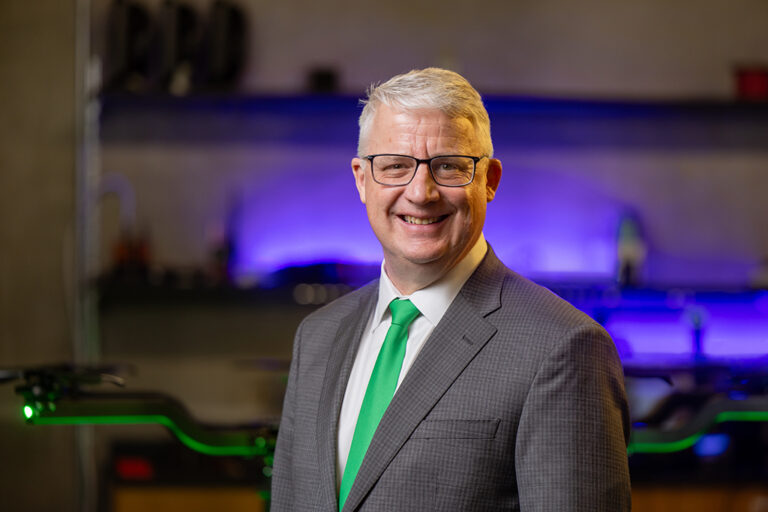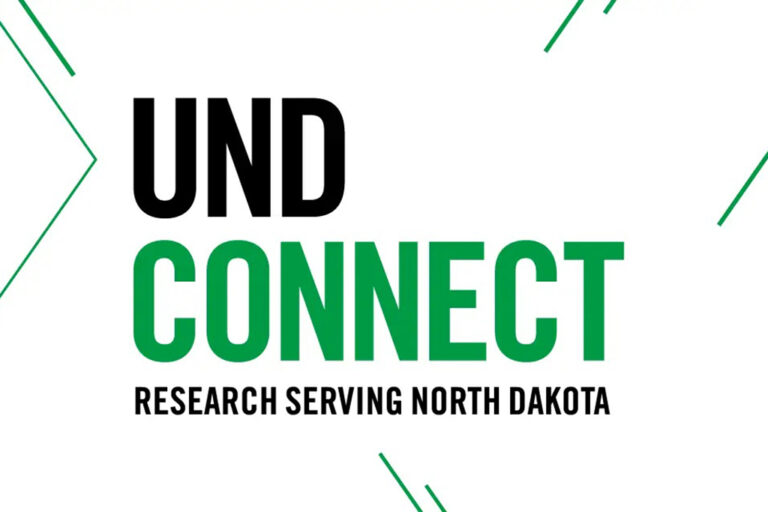GRAD 2021: Bridging the gap through research
School of Graduate Studies event lets graduate students – the lifeblood of research universities – share their scholarly pursuits

Through a year where opportunities to meet, gather and exchange ideas have been far too few, UND events such as the annual Graduate Research Appreciation Day (GRAD) carry a special significance.
Such were the words of Chris Nelson, associate dean of the School of Graduate Studies, before he announced the prize winners among GRAD’s three categories of scholarly competition: engineering, natural sciences and professional, social sciences and humanities and arts.
Indeed, the fifth year of GRAD – established and coordinated by UND’s School of Graduate Studies – had a different look and feel, taking place exclusively over Zoom. Last year, the research showcase was one of the last in-person events covered by UND Today before the COVID-19 pandemic struck.
For years now, graduate students have gathered from programs and labs across campus to share their research, thesis projects and scholarly pursuits with faculty judges, fellow students and the curious public. At the end of the day, scholarship prizes up to $500 are dispensed to students in the top three.

According to Nelson, the event is one of the best to highlight the breadth, depth and variety of research happening on campus. In his words, graduate students are the “lifeblood” of high-level research universities such as UND.
The COVID-19 pandemic has done little to affect that importance. More than 100 students took part in GRAD 2021, which spanned Wednesday and Thursday last week in its altered format.
“Though it couldn’t be as broad as a physical event, where people are wandering back and forth across the show floor, we still captured that live interaction element that I think is so important,” Nelson said. “And honestly, like I said, I thought it was extra important in a year like this. Call it a glimpse of normality.
“I think this GRAD event provided that, by providing people the opportunity to share and talk about their work.”
‘Bubbles’ brought together
This year, groups of five students gathered in Zoom sessions chaired by three faculty judges and a moderator. Each had ten minutes to both present their research topic and answer questions from judges.

First-time participant Regan Lawrence, a master’s student studying biochemistry, took a note from her third-place finish in the recent Three-Minute Thesis competition and used PowerPoint slides for her talk – a stylistic deviation from the poster board perspective commonly associated with GRAD.
Looking at finishing her degree this summer, Lawrence walked her audience through the importance of fatty acid-binding proteins in the livers of mice, as they relate to overall organ and cellular health. Disabling even one of these many types of fat-processing proteins in the liver affected brain fat mass and overall fat content in the blood, she said.
The most common role for fat, in both mice and humans, is making up cell membranes throughout the body, Lawrence said, so she’s looking forward to seeing what types of implications her research could have for human health.

The third-year graduate student said taking part in the competition was good for not only brushing up on her communication skills, but also breaking out of the “bubbles” that might form around programs, departments and fields of study.
“I’ve never been exposed to what’s happening with engineering students, or people studying arts and humanities,” said Lawrence after being part of a session involving topics such as AI deep learning in civil engineering, linkages between marital status and tooth loss and tectonic inversion’s impact on oil recovery.
“So it’s really nice to see what others are doing, and I think that’s a big draw for this kind of event. As a layperson, comparatively, I’m able to understand why they’re addressing these questions.”
Bridging the gap
Taking Lawrence’s “bubbles” comment further, this year’s GRAD also showed how the virtual setting did more to engage UND’s growing cohort of online graduate students.
In previous years of the competition, students presenting from a distance would record their research pitch and have it play on a monitor on the show floor. It wasn’t easy for these presentations to have an equal presence over the din of in-person discussions and socialization. This year, the playing field was leveled.
Julie Bean, student services and communications coordinator for the School of Graduate Studies, said that moving the School’s programming online through the past year provided many lessons leading up to its biggest event in GRAD. As a result, the School plans to implement an online component into most, if not all, of its future in-person programming.
“This will be a huge benefit to our students, as it will help ensure that our programs are fully accessible to both on-campus and distance students,” said Bean, who handles much of the behind-the-scenes work in putting together events such as GRAD, the Three-Minute Thesis competition and graduate orientation.
Doctoral student Lalan Mishra experienced such a benefit first-hand, as he took first place in the engineering category from the comforts of his San Diego, Calif., home.
Nelson was intrigued by Mishra’s exceptional performance, noting his status as a nontraditional student as well as being perhaps the first distance student to top the podium at GRAD.

Studying under the advisement of Professor Naima Kaabouch in the School of Electrical Engineering and Computer Sciences, Mishra – decades into his career in the telecommunications industry – has been working toward his Ph.D. in electrical engineering since 2019. The poster he created for GRAD addressed the exponentially increasing security risks for wireless devices as more devices are introduced to consumers each year.

Mishra is studying how to implement better forms of encryption as two devices communicate, such as phones over a wireless network. The problem is that as technology advances, so do the abilities to decipher encryptions and intercept messages and data. Mishra is looking at ways for devices to, as he says, code hop – to constantly iterate the rules of data exchange between devices, as opposed to maintaining one ruleset that can be cracked and decoded.
“The topic of my presentation was from a high-level perspective, considering that I’m still in the survey phase of my work,” Mishra said. “I basically introduced a problem, and I wanted to make sure that people not involved in my field could understand it.”
He went on to say that the topic of his GRAD poster is just one of a myriad problems the advancing technology faces, but ultimately, in the later years of his career, he’s looking to solve problems that will have long-lasting impacts on the wireless industry. At UND, he’s found a program that can provide quality and flexibility for his professional aspirations.
“Hearing from other people about their ideas and research concepts was very illuminating in the sense that UND is no doubt establishing itself as a very good research university,” Mishra remarked.
As for the technology, Mishra said it has been what’s enabled him to continue his education as effectively as he has, and it has “closed the gap” when considering the ability of people to work, research and share ideas remotely.
And as impressed as Mishra was by the other research presented in his session, whether about biofuel production via gas fermentation or the role of albedo in the glacial melting rates, he was just as surprised when his name was called for first place.
“I was surprised because I really participated for the fun of participating,” said Mishra, who earned a $500 scholarship prize for his work. “You never know, because so many other people presented good research, but maybe my topic and message was readily understood.
“My motto is that learning should be a lifelong goal for everybody, and I think GRAD and UND are helping me with that.”



